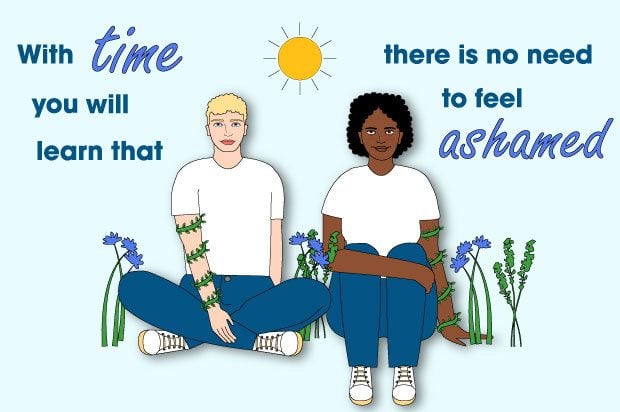Ambassador voices: Breaking the self-harm stigma

My name is Rachel Elder. I am an English Literature student at the University of Edinburgh and a Young Ambassador for The Mix, most recently involved in The Body and Soul Club.
Self-harm is a huge issue among young people in today’s society. The drastic rise in self-harm statistics in the UK is hugely concerning. Even more alarming is the number of young people who don’t reach out for support for these issues due to the shame they feel around the topic, influencing their ability to ask for help.
Despite huge leaps in mental health awareness in recent years, there is still a great number of misconceptions around certain issues, self-harm being a leading issue with relation to stigma. After many tireless campaigns, many young people still feel as though they must hide their self-harm in fear of judgement.
However, many people fail to realise that self-harm isn’t an entirely negatively motivated action. People of all ages use self-harm as a coping mechanism, and although not a helpful one, it is a behaviour which holds a great deal of logic behind it.
Dealing with self-harm is not as unusual as some may assume and, despite shame being largely associated with self-harm, there is nothing embarrassing or ‘wrong’ in trying to find ways to cope with difficult emotions. The important thing is realising that these emotions may be influencing your actions. It is essential that we reach out for support in order to seek new, healthier coping mechanisms that still offer emotional relief without inflicting further emotional or physical pain.
Many people who have self-harmed are told to ‘cover up’ in an effort to hide the outward symptom of a much deeper internal struggle. In the case of ‘new’ or unhealed self-harm, or pictures showcasing self-inflicted wounds, this can be understandable as it is usually in an effort to protect other vulnerable young people from potentially triggering images. This is vital in a society that is often driven to comparison.
This topic of censorship has been huge lately and, in many ways, it’s understandable that the sharing of graphic images of self-harm is completely unnecessary, even when discussing the topic or raising awareness. There will never be the need for photographic evidence in order to justify discussing the topic. Somebody with a heart condition may not appear physically ill at all, but their struggle is still valid, and they can still discuss this openly.
However, those with healed self-harm should still possess the right to wear clothes of their choice and share photos that showcase a fun night out, or their team’s success at a sports match without having to cover up the scars of their past struggles. When someone goes out to do something that is unrelated to their mental health, they should not have to base their outfit or their position in a group photo to hide the way that their body is.
The stigma that dictates how self-harm should appear – or rather not appear – in a social context merely creates further issues surrounding body-image and, consequentially, creates further mental health problems for young people who are made to feel as though their body is not acceptable in society.
My message to you if you currently or ever have struggled with self-harm; you are not alone and with time you will learn that there is no need to feel ashamed. My message to those who have not experienced self-harm; it takes nothing away from a person to offer kindness and tolerance to others.
If you or someone you know is affected by self-harm, The Mix are here to help. Head to our Self-Harm Awareness Day page to find advice and support.
Learn about supporting someone who self-harms.
Next Steps
- selfharmUK provides information and advice about self harm. You can ask a question to their expert panel or share your story.
- Mind offers advice and support to people with mental health problems. Their helpline runs nine to six from Monday to Friday. 0300 123 3393
- If you're under 25 and would like free confidential telephone counselling from The Mix to help you figure things out complete this form and we'll call you to arrange your first session.
- Switchboard LGBT+ Helpline offers a range of help services for the LGBT community, including message boards and a helpline. 0300 330 0630
- Chat about this subject on our Discussion Boards.
By Holly Turner
Updated on 02-Mar-2020
Sorry, comments closed
No featured article














